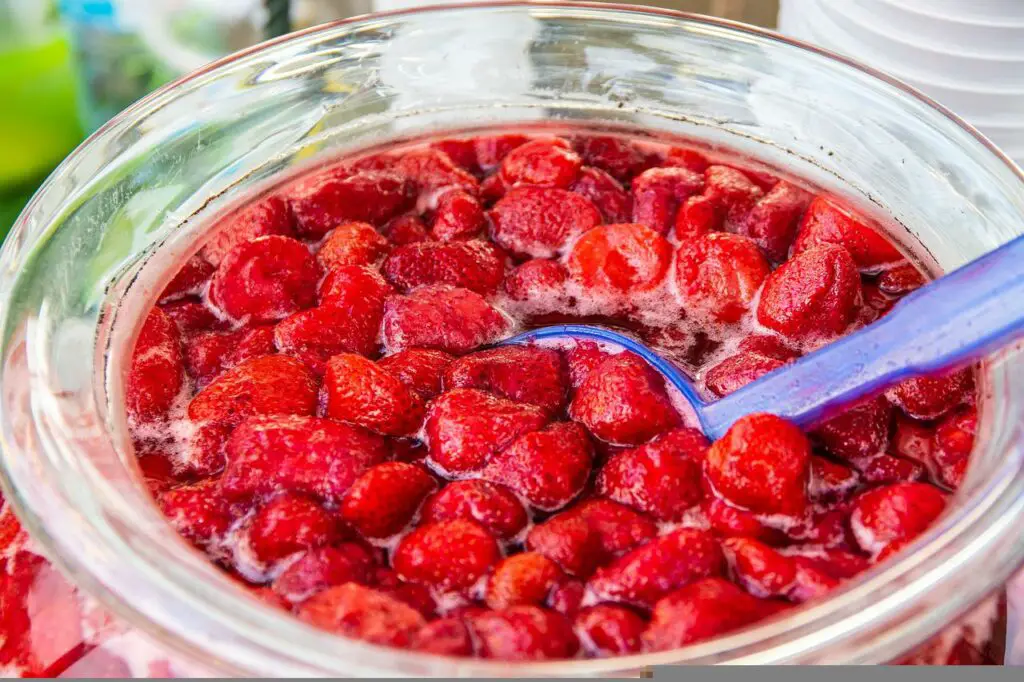Dogs can eat anything on their way.
If your pup has a sweet tooth, give them dog-safe treats.
Strawberries are recommended for dogs if prepared appropriately due to their natural health benefits.
As a dog parent, it’s tempting to share those yummy strawberry jellies with your dogs when they give you those sweet cute eyes.
Just a few licks occasionally, but don’t make it a habit.
So can dogs eat strawberry jelly?
Yes, dogs can eat strawberry jelly in moderation and if well prepared.
Although strawberry jelly is not lethal, the ingredients and preservatives in store-bought jelly can be harmful to dogs.
Excess sugar in jellies can potentially cause diabetes, obesity, pancreatitis and body inflammation.
Strawberry fruit is nutritious, and you can opt for smoothies instead of jelly.
What if your dog accidentally gobbles a can of strawberry jelly?
This article details the risks, benefits and what you should do in such an incident.

Nutritional benefits of strawberries in dogs
Strawberries are a super fruit with dense nutritional benefits to dogs.
High in water and low carb and fat contents, perfect for an everyday treat.
It contains enzymes and properties that help whiten teeth, regulate blood sugar, prevent some cancers and improve heart health.
- Low carbohydrates levels – Most of the carbs in strawberries from simple sugars help regulate blood sugar levels in dogs.
- Source of vitamins – Strawberries are rich in vitamins B1, B6, C, and K. Vitamin C is an antioxidant good for immune and skin health. It also contains folate, essential for cell growth and development, especially in senior dogs.
- Rich in minerals – Strawberries have manganese essential for vital processes in the body, such as digestion and cell functioning. Traces of potassium in strawberries aids in blood pressure regulation, boost the immune system and reduce ageing effects.
- High-fibre content – Strawberries have about 25% fiber, both soluble and insoluble. Dietary fibers feed the good bacteria in your dog’s gut to improve their digestive health.
- Low-fat levels – This helps in weight management and reduces the risk of obesity in your dogs.

Risks of feeding your dog strawberry jelly
Strawberry jam doesn’t provide any nutritional value to your canine friend.
While not poisonous, the ingredients are high in sugar, additives, and preservatives unnecessary for your dog’s diet.
High sugar
Sugar is an essential part of your dog’s diet but is dangerous in high amounts.
Jelly contains added sugars for sweetness.
These sugars are complex for your dog’s digestive system to process, risking weight gain and diabetes.
Sugary items could cause tooth decay in canines if consumed regularly.
Artificial sweeteners
Store-bought strawberry jellies are packed with artificial sweeteners.
Xylitol is the most common and found, especially in sugar-free jellies.
Even in small amounts, xylitol is extremely dangerous to dogs.
Corn syrup
Strawberry is already a sweet fruit, and adding fructose corn syrup and cane sugar raises the sugar levels out of proportion.
While this is not toxic to dogs, it could cause large amounts of stomach irritation and health problems.
The best approach is to make jelly right at home with fresh strawberries for a nutritious dog treat.
Pectin
This is a highly soluble fiber that is fine when consumed in moderation.
Too much of it can cause pectin toxicity, resulting in difficulty breathing, stomach cramps, and fluid buildup in your dog’s chest.
Citric acid
Besides the fact that citric fruits don’t sit well with carnivore’s taste buds, it’s not recommended for a dog’s health.
The acidity could cause diarrhea, vomiting, and upset stomach.
Strawberry jelly substitutes for your dog
The best alternatives are treatments that don’t evoke an allergic reaction or make the dogs sick.
Fortunately, most human foods are god-friendly.
Instead of store-bought strawberry jelly, let the dogs munch on wholesome and healthy snacks such as:
- Fruits smoothies – strawberries, apples, bananas, and blueberries.
- Vegetable smoothies – carrots and green beans are also a great treat.
- Peanut butter is a great alternative that your dog will love.
What happens if my dog overeats strawberry jelly?
If your furry pal accidentally ingests a lot of strawberry jam, there’s a problem.
First, check for the following symptoms difficulty breathing, upset stomach, vomiting, diarrhea, and body pains.
The presence of these symptoms requires immediate attention from your vet.
Some dogs may not react right away, but be sure to monitor them closely.
Possible consequences of too much strawberry jelly include:
- Pancreatitis: Too much sugar prompts the pancreas to produce extra digestive enzymes to metabolise glucose. This inflames the pancreas, and continuous production leads to pancreatitis, fatal for your dog.
- Cavities: Jelly and sweet candies accelerate the appearance of cavities and damage gum tissues in dogs. This leads to bad breath and tooth decay; why risk?
- Obesity: Excess sugar is stored as fat in your pup’s body, leading to weight gain and stressed joints in the long run.
When shouldn’t you feed your dog strawberry jelly?
If your dog is diabetic or overweight and is irritated by citric acid, avoid feeding them strawberry jam, even in small amounts.
Always ensure the jelly is out of reach since dogs can eat anything they come across.
Try homemade strawberry jelly or fresh fruit smoothies as treats instead.
Avoid canned strawberries or strawberries in syrup; they are harmful to your pup if consumed in large quantities.
Frequently asked questions (FAQs)
Can I feed strawberry jelly to my diabetic dog?
No.
Although not toxic, strawberry jelly contains high sugar levels, additives and preservatives bad for your dog’s health.
However, the strawberry fruit is an excellent healthy option for dogs with diabetes.
Can puppies eat strawberry jelly?
No.
The high sugars can be damaging to a puppy’s digestive system.
This may result in diarrhea, vomiting and a sensitive stomach.
If they take too much of it, immediate vet intervention is necessary.
Conclusion
Strawberry jelly is a delightful treat for most people; regrettably, it isn’t the same for your furry friend.
While strawberries are healthy, the jelly poses a threat in the long run.
Although it’s tempting to share some strawberry jelly with your canine pal, they’ll enjoy it better if you offer healthier alternatives.
- What Dog Breeds Have Pink Skin? - March 24, 2023
- What Are the Most Inspiring Dog Breeding Quotes? - March 20, 2023
- Can Pheromone Spray Help Improve Dog Breeding Results? - March 19, 2023








